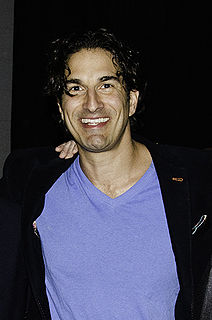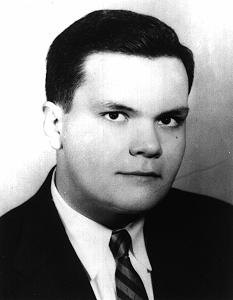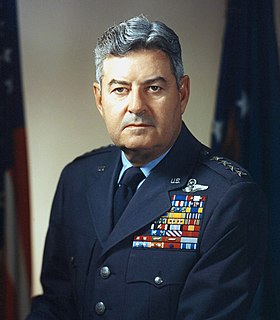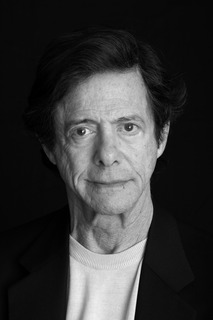Top 1116 Hydrogen Bomb Quotes & Sayings - Page 17
Explore popular Hydrogen Bomb quotes.
Last updated on December 18, 2024.
It's despair at the lack of feeling, of love, of reason in the world. It's despair that anyone can even contemplate the idea of dropping a bomb or ordering that it should be dropped. It's despair that so few of us care. It's despair that there's so much brutality and callousness in the world. It's despair that perfectly normal young men can be made vicious and evil because they've won a lot of money. And then do what you've done to me.
No matter how much of our liberty Washington takes away in the name of security, there are no guarantees that there won't be another terrorist attack. Instead of attacking American liberties, the government ought to go after terrorists in their countries of origin. It should be like what our military attempted during WWII. Don't wait to defend ships against the kamikaze -- bomb the fields where they take off.
The most dangerous thing Iraq could have ever had was a nuclear weapon. The nuclear weapon Iraq was trying to build was not deliverable by bomb or ballistic missile. It was a large, bulky device that they hoped to bury and set off to let the world know they had a nuclear weapon. They never achieved that.
Most people use twenty verbs to describe everything from a run in their stocking to the explosion of an atomic bomb. You know the ones: Was, did, had, made, went, looked... One-size-fits-all looks like crap on anyone. Sew yourself a custom made suit. Pick a better verb. Challenge all those verbs to really lift some weight for you.
The cosmos exploded, actualizing its potentiality of space and time. The centers of power, like fragments of a bursting bomb, were hurled apart. But each one retained in itself, as a memory and a longing, the single point of the whole; and each mirrored in itself aspects of all the others throughout all the cosmical space and time.
All the green in the planted world consists of these whole, rounded chloroplasts wending their ways in water. If you analyze a molecule of chlorophyll itself, what you get is one hundred thirty-six atoms of hydrogen, carbon, oxygen, and nitrogen arranged in an exact and complex relationship around a central ring. At the ring's center is a single atom of magnesium. Now: If you remove the atom of magnesium and in its exact place put an atom of iron, you get a molecule of hemoglobin. The iron atom combines with all the other atoms to make red blood, the streaming red dots in the goldfish's tail.
The only two TV shows I saw do that, where they don't warm them up and you can really bomb, was Saturday Night Live - and that's why it gets a lot of heat, too. Obviously it gets criticism fairly, too. But a lot of it is because Lorne [Michaels] lets the audience decide and doesn't force them to laugh.
As the wealthiest country with all the blessings that we have, do we have an obligation to help the outside world? I think we do, as we have an obligation to help everyone within our own borders. The problem is that this automatically gets translated into: "What's the point of having a huge military if we can't bomb people?" That's the problem that I have. Our foreign policy is essentially our defense policy.
In this particular historical moment, the notion of conjuncture helps us to address theoretically how youth protests are largely related to a historically specific neoliberal project that promotes vast inequalities in income and wealth, creates the student-loan-debt bomb, eliminates much-needed social programs, eviscerates the social wage, and privileges profits and commodities over people.
We're so willing to dehumanize entire populations in order for us to conveniently go along with our lives. We know exactly one North Korean, for example. The rest of them, we don't know - but it makes it very easy to bomb North Korea if we pretend they're all one person. Literature makes it harder to dehumanize people in this way.
For there is another kind of violence, slower but just as deadly, destructive as the shot or the bomb in the night. This is the violence of institutions; indifference and inaction and slow decay. This is the violence that afflicts the poor, that poisons relations between men because their skin has different colors. This is a slow destruction of a child by hunger, and schools without books and homes without heat in the winter.
You can't have a democracy with an armed political party willing to bomb its neighbor without the consent of its government or, you know, just deciding, "Well, let's create enough chaos and discord by lobbing rockets. And so the reality is in order for Lebanon to succeed and we want Lebanon's democracy to succeed the process is going to the Lebanese government's eventually going to have to deal with Hezbollah.
Between notes, he had contemplated means of destroying Myrna Minkoff but had reached no satisfactory conclusion. His most promising scheme had involved getting a book on munitions from the library, constructing a bomb, and mailing it in plain paper to Myrna. Then he remembered that his library card had been revoked.
The only rule Muslims know is to win. It does not matter how. All rules can be broken as long as they win the war. They can lie, they can deceive, they can break their treaties as Muhammad did, they can ambush or use terror, assassinate, massacre the children and bomb civilians. Muslims can even kill each other as long as this improves their chance of winning.
The reactors in Japan are stable in the same way that a ticking time bomb is also stable. It wouldn't take much to light the fuse - a 6.6 earthquake, like what happened today in Japan, a pipe break, an over-pressurized containment vessel - anything could set it off, in which case we would have another Chernobyl, three times the magnitude of a Chernobyl accident.
I have no doubt that if an actual ticking bomb situation were to arise, our law enforcement authorities would torture. The real debate is whether such torture should take place outside of our legal system or within it. The answer to this seems clear: If we are to have torture, it should be authorized by the law.
However, I think we have to go back to the American bogeyman - we have to understand that this is a country which currently allows American drones to fly over our skies and bomb our people on an almost weekly basis, this is a country that survives on American aid in the billions. Today's headline in the newspapers is about America stepping up arms supplies to Pakistan.
Humanity is sitting on a time bomb. If the vast majority of the world's scientists are right, we have just ten years to avert a major catastrophe that could send our entire planet's climate system into a tail-spin of epic destruction involving extreme weather, floods, droughts, epidemics and killer heat waves beyond anything we have ever experienced - a catastrophe of our own making.
They don't allow you to go any further unless you can do this bomb suit training, because it puts such a mental strain on your spirit. It dumbs you down about 25 to 30 IQ points. You start to hallucinate in the heat inside the suit after 20-30 minutes. So you try not to stay in it too dang long. So the preparation for that - it's either you have it, or you do not.
It is just as much a matter of chance that I am still alive as that I might have been hit. In a bomb-proof dug-out I may be smashed to atoms and in the open may survive ten hour's bombardment unscratched. No soldier outlives a thousand chances. But every soldier believes in Chance and trusts his luck.
Two subsequent incidents of import established CNN: the explosion of the space shuttle Challenger in 1986, which CNN was the only network to cover as it happened, and the 1991 Gulf War, which CNN chronicled round the clock from a proximity as irresistible as it was alarming, bomb blasts and gunfire lighting up TV screens from coast to coast.
My solution to the problem would be to tell [the North Vietnamese Communists] frankly that they've got to draw in their horns and stop their aggression or we're going to bomb them into the Stone Age. And we would shove them back into the Stone Age with Air power or Naval power - not with ground forces.
Our military superiority is so great - it's far greater than it was in the Gulf War, and the Gulf War was over in 100 hours after we bombed for 43 days. And so now they can bomb for a couple of days and then just roll into Baghdad... The odds are there's going to be a war and it's going to be not for very long.
The Kurds had always had a bad time. They were oppressed by the Ottoman empire. Then, at the end of the First World War, they were promised a homeland, but the new Turkish state refused to give them any land, while the British went and created the new state of Iraq and sent aircraft to bomb the Kurds there into submission.
Now if you ask me, in conclusion, "Well, what, then should properly be done?" Obviously war, but I mean in regard to this issue I would say: Any way possible permission should be refused and if they go ahead and build it, the government should bomb it out of existence, evacuating it first, with no compensation to any of the property owners involved in this monstrosity.
If you can't, or won't, think of Seymour, then you go right ahead and call in some ignorant psychoanalyst. You just do that. You just call in some analyst who's experienced in adjusting people to the joys of television, and Life magazine every Wednesday, and European travel, and the H-bomb, and Presidential elections, and the front page of the Times, and God knows what else that's gloriously normal.
This flirtation with isolationism in the Republican party is over. It's giving way to a more muscular foreign policy than I've been advocating. But I'm also advocating building up others. Build a small schoolhouse in Afghanistan to help a poor young girl have a say about her children will destroy the ideology more than a bomb.
Every once in a while I'll say something...I dropped the F-bomb early on in my career. There was this lesbian couple and they looked super-hip. One of them looked at me and shook her head, like "Don't do that." I think she was doing it to say, "It doesn't work." She didn't say anything but it was this cautionary moment. I knew it didn't work. There are just so many other words to choose from.
At exactly fifteen minutes past eight in the morning, on August 6, 1945, Japanese time, at the moment when the atomic bomb flashed above Hiroshima, Miss Toshiko Sasaki, a clerk in the personnel department of the East Asia Tin Works, had just sat down at her place in the plant office and was turning her head to speak to the girl at the next desk.
US opposition to Russia and China has entailed sanctions against Russia, and Russia in turn has made counter-sanctions against Europe. So Europe is essentially sacrificing its opportunities for trade and investment in order to remain part of NATO. It is also agreeing to bomb Syria and the Near East, creating a wave of refugees that it doesn't know what to do with.
Star Trek speaks to some basic human needs: that there is a tomorrow — it's not all going to be over with a big flash and a bomb; that the human race is improving; that we have things to be proud of as humans. No, ancient astronauts did not build the pyramids — human beings built them, because they're clever and they work hard. And Star Trek is about those things.
We don't talk about that at all as a country. I think that most people assume that there's nothing they could do if a nuclear bomb went off in their city. And that's just not true. Most people would survive most terrorist nuclear attacks because the bombs would likely be much smaller than those we were dealing with in the Cold War.
America had Russia wrapped around it little pinky through the whole '90s. We did everything you told us. And we were eager to do more and more. The whole nation - Russian nation was like, 'Tell us what else we can do to please you. We want to be like you. We love you.' And then in 1999, bam. You bomb Yugoslavia. And that was the end of it.
The boy and girl going hand in hand through a meadow; the mother washing her baby; the sweet simple things in life. We have almost lost track of them. On the one side, we over-intellectualize everything; on the other hand, we are over-mechanized. We can understand the danger of the atomic bomb, but the danger of our misunderstanding the meaning of life is much more serious.
Byrnes... was concerned about Russia's postwar behavior. Russian troops had moved into Hungary and Rumania, and Byrnes thought it would be very difficult to persuade Russia to withdraw her troops from these countries, that Russia might be more manageable if impressed by American military might, and that a demonstration of the bomb might impress Russia.
All the reputedly powerful reactionaries are merely paper tigers. The reason is that they are divorced from the people. Look! Was not Hitler a paper tiger? Was Hitler not overthrown? U.S. imperialism has not yet been overthrown and it has the atomic bomb. I believe it also will be overthrown. It, too, is a paper tiger.
One often feels as though something had happened before, I remember. It comes quite close to you and stands there and you know it was just this way once before, exactly so; for an instant you almost know how it must go on, but then it disappears as you try to lay hold of it like smoke or a dead memory. "We could never remember, Isabelle," I say. "It's like the rain. That has also become one, out of two gasses, oxygen and hydrogen, which no longer remember they were once gasses. Now they are only rain and have no memory of an earlier time.
I've seen many men die right in front of me - so many in fact that I've become almost hardened to it. Having seen the worst that human beings can do to each other, the results of torture, mutilation and seeing someone blown to pieces by a bomb, you develop a kind of shell. But you had to. You had to. Otherwise, we would never have won.
The technological overflow from scientific research has brought scientific research this bad name about carrying an irresponsibility and an alienation from God - because scientific research has led to things like the atom bomb, it's led to problems with depletion of ozone in the Earth's atmosphere, or at least it's revealed those problems.
The passion for playing chess is one of the most unaccountable in the world. It slaps the theory of natural selection in the face. It is the most absorbing of occupations. The least satisfying of desires. A nameless excrescence upon life. It annihilates a man. You have, let us say, a promising politician, a rising artist that you wish to destroy. Dagger or bomb are archaic and unreliable - but teach him, inoculate him with chess.
Let's just say that if these scientist had been using their brilliance for good instead of evil, cars would run off water vapor and leave fresh compost behind them; no one would be hungry; no one would be ill; all buildings would be earthquake-, bomb-, and flood-proof; and the world's entire economy would have collapsed and been replaced by one based on the value of chocolate.
The atom bomb fueled the entire world that came after it. It showed that indiscriminate killing and indiscriminate homicide on a mass level was possible ... whereas if you look at warfare up until that point, you had to see somebody to shoot them or maim them, you had to look at them. You don't have to do that anymore.
The family today counts for less and less. Why? Who knows - the growth of science, the Cold War, the atomic bomb, the world war we've made, the new philosophies we've created; certainly something is happening to man, so why go against it, why oblige this new man to live by the mechanisms and regulations of the past?
Here's an easy way to see if a war movie is being truthful: If you see an explosion on a faraway hillside and the sound of the explosion and the detonation of the bomb happen at the same time - if they're putting the sound and the vision together in the same moment - they're going toward our cultural understanding of war, not the reality of war.
Dropping of the atomic bomb was the main subject of conversation for many years and so people had very strong feelings about it on both sides and people who thought it was the greatest thing they'd ever done and people who thought it was just an unpleasant job and people who thought they should have never done it at all, so there were opinions of all kinds.
The British bombed German cities [during World War II] to keep the workers awake at night. So instead of dropping one bomb, we sent a thousand planes and, yes, we took out the factory sometimes, but we also took out the city. It reached the point where we wanted more efficient ways to destroy a city. The result was nuclear weapons.
The writer has a grudge against society, which he documents with accounts of unsatisfying sex, unrealized ambition, unmitigated loneliness, and a sense of local and global distress. The square, overpopulation, the bourgeois, the bomb and the cocktail party are variously identified as sources of the grudge. There follows a little obscenity here, a dash of philosophy there, considerable whining overall, and a modern satirical novel is born.
It would seem to be the case that pressure on Iran to acquire nuclear weapons is almost totally driven by their need for a deterrent capability to avoid the fate of Iraq, Libya. The use of American military force in Syria thus sends exactly the opposite message as supposedly desired to the leadership in Tehran - and to others. North Korea has been dealt with diplomatically because it has the bomb and might use it if provoked.
Overall, The Population Bomb was probably too optimistic. I was writing about climate change - Anne and I actually wrote the book. We discussed whether or not you'd have to take a gondola to the Empire State Building, and that sort of thing, but we didn't know at the time whether the climate change would be in the direction of heating or cooling. We just didn't know enough about it.

























































